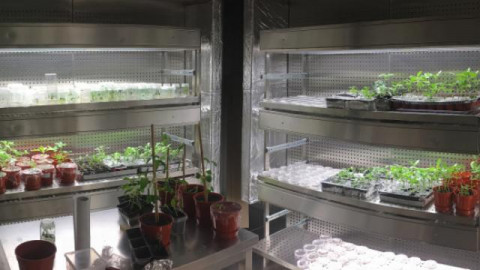TarLab Biotechnology, which succeeded in releasing 100 percent pure sunflower seeds by using genetic purification technology, plans to work on paddy, wheat and canola.
Founded by entrepreneurial academics of Marmara University, TarLab succeeded in making sunflower seeds genetically 100 percent pure in a short time. According to the statement made by TarLab Biotechnology, it has achieved success in reducing foreign dependency on sunflower seeds.
By reducing the improvement period of sunflower, which takes about 15 years with classical methods, to less than 5 years with the improvements with its existing technologies, TarLab Biotechnology managed to make 100 percent pure genetically in a short time, thus, it has achieved a first in Turkey.
It has received academician-based company title
TarLab Biotechnology was established with the contributions of Marmara University Innovation and Technology Transfer Application and Research Center (MITTO) and with the support of TUBITAK's 1512 Techno-entrepreneurship Capital Support Program (BIGG).
Established by Director of MİTTO Prof. Dr. Ahu Altınkut Uncuoğlu, Prof. Dr. Yıldız Aydin of Biology Department and Yunus Emre Aktaş, who is a Ph.D. student of Bioengineering department, TarLab Biotechnology also provides services to plant breeders and seed companies with its developed methods and, with the support of Tübitak BİGG, has received the first and only academic-based title company in Turkey.
The project gained momentum with the master's studies of Yunus Emre Aktaş, who works as a scholarship student in this project. Within the scope of the project, it was achieved to produce sunflower seeds at low cost and with 100 percent genetic purity by using modern biotechnological methods with the infrastructure and knowledge of Marmara University Faculty of Arts and Sciences Biology Department and Faculty of Engineering Bioengineering Department.
Following the decision to commercialize this success by creating added value for the benefit of the country, TarLab was established with the contributions of MITTO and with the support of TUBITAK 1512 Techno-entrepreneurship Capital.
There is no other company that offers this service in sunflower
MİTTO Director Prof. Dr. Ahu Altınkut Uncuoğlu stated that the most important motivation for establishing a company for the commercialization of the success that was achieved as the result of the project is the responsibility they feel towards society and their countries.
"In our country, there are academicians who conduct researches to develop pure varieties in sunflower and other product groups with modern technologies, but as far as we know, there is no initiative to corporate and commercialize. The first spin-off that was established with the support of TÜBİTAK is TarLab. There has been a justified interest for TarLab both in our country and in the world because of the absence of any company offering this service in sunflower.
Saying that it has been signed agreements with both Turkey and France and Germany’s leading seed companies to provide this service with great excitement and motivation, Uncuoğlu added "Thus, our country's academicians offered local solutions with the improvements they made on existing technologies with their own knowledge and experience”.
One of the founding partners, Prof. Dr. Yıldız Aydın said about the method that enabled them to achieve international success in such a short time, “The seeds developed with the method we apply are used as rootstock for breeding. With classical breeding methods in the field, this takes many years and the transmission of good genes is a bit coincidental. This method, which shortens the seed breeding time, contributes to the reduction of production costs by using it with classical breeding methods. "
Next is rice, wheat and canola
Yunus Emre Aktaş, General Director of TarLab Biotechnology, stated that while establishing TarLab, they aim to expand their product portfolio in the long term and apply the same method in different plant species, and stated that they are currently working on paddy and planning to experiment on wheat and canola.
Saying that doubled-haploid (genetic purification) technology service provided by TarLab also constituted an important step in reducing foreign dependency on seeds, Aktaş emphasized because Turkey uses a considerable proportion of imported seeds, we need to shorten the breeding time to compete with the world.
Aktaş said, “With this service we provide, value-added seeds will be produced in a short time. We need to accelerate the transfer of these resource plants to industry, production and appropriate plants. "

